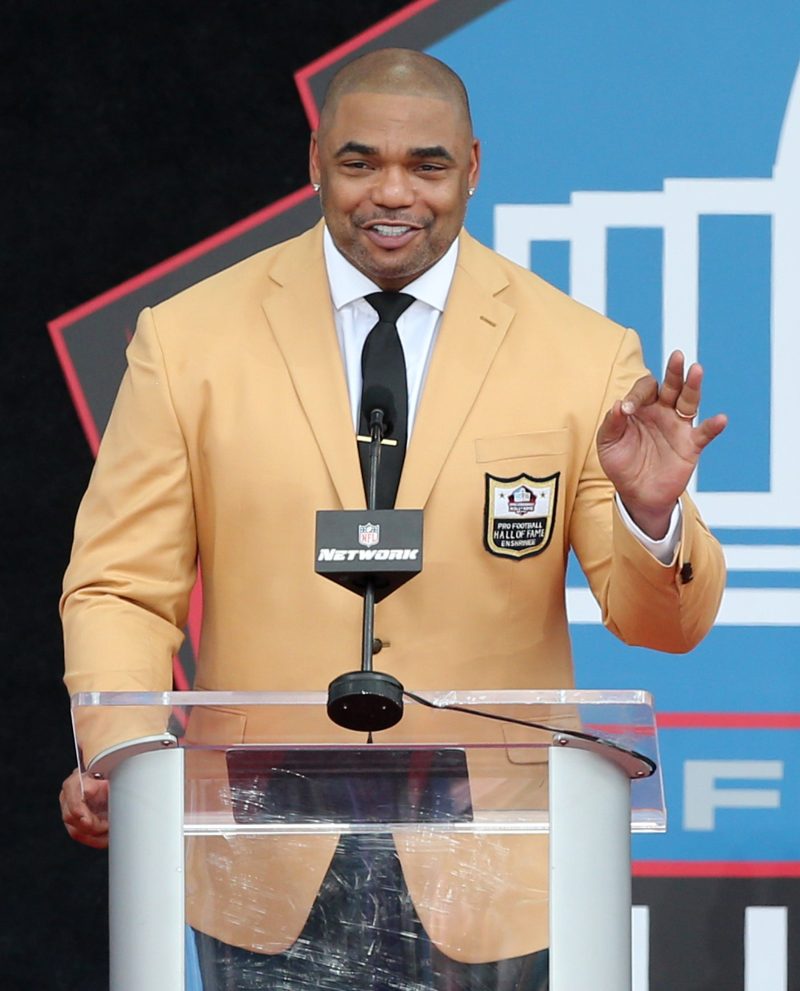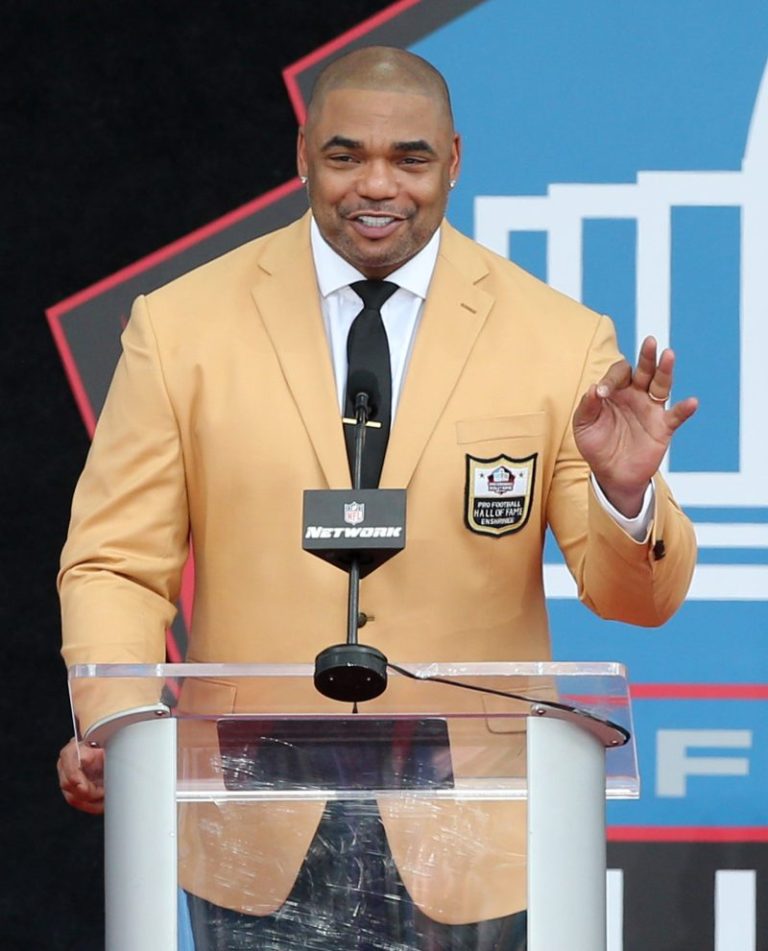
JOHNS CREEK, Ga. – It has been nearly 16 years since Richard Seymour felt the sting of a certain type of NFL business. In the prime of a Hall of Fame career, Seymour was abruptly traded from the NFL penthouse to what must’ve seemed like the outhouse.
The week of the season opener in 2009, the New England Patriots shipped the dominant defensive lineman and his collection of three Super Bowl rings to the Oakland Raiders.
Call it a classic Bill Belichick move. Cut ties too early rather than too late. Nothing personal, just cold NFL “bidness” that fetched the premium return of a first-round draft pick. And Seymour never saw it coming.
His world was flipped upside down to such a degree – Richard and his wife, Tanya, had four young children, and the new school year was starting – that it prompted then-Raiders owner Al Davis to fire off a “five-day letter” threatening a season-long suspension when Seymour didn’t immediately report.
And look at him now.
Seymour, 45, owns a piece of the Las Vegas Raiders. His deal to purchase a stake of the franchise from Mark Davis – reportedly a 0.5% slice – was approved by NFL owners in October 2024 at the same time Tom Brady’s package with Knighthead Capital Management’s Tom Wagner for a 10% share was finalized.
Turns out, that stunning trade worked out much better than Seymour would have imagined at the time. Talk about another type of NFL business.
“Sometimes, you don’t know what God has planned for you,” Seymour told USA TODAY Sports, reflecting during an expansive interview at a suburban Atlanta coffee shop. “If I never got traded, I don’t think I’d have become an NFL owner.”
An NFL owner. Let that sink in. Seymour didn’t generate the type of headlines that Brady did in buying into the Raiders, and his share doesn’t compare to Brady’s slice, yet it is so significant on multiple levels. In a league that has never had a Black majority owner, Seymour is part of a growing number of limited partners with stakes in NFL franchises who happen to be Black, the lineup including former athletes Earvin “Magic” Johnson, Serena and Venus Williams, Warrick Dunn and Charles Woodson, in addition to financial power broker Mellody Hobson and former Secretary of State Condoleezza Rice.
That Seymour had significant support during his lengthy process from NFL Commissioner Roger Goodell, among other NFL heavyweights, is no coincidence. Goodell has repeatedly talked up the desire to increase ownership paths for minorities, and in Seymour’s case apparently backed up the sentiment as a key resource.
“Obviously, it’s important to have representation when we speak about a league that is 70% Black,” Seymour said, referring to the player population. “You want representation at every level, from ownership to management, front office, whatever it is. You just want to make sure it’s the right people and that voices are heard.”
Now consider the pure business play. The Raiders ranked as the NFL’s seventh-most valuable franchise in 2024 on Forbes’ annual list with a valuation of $6.7 billion. That’s nearly double what it was deemed worth when Seymour and Davis began discussing the possibility of doing business in 2020, the year the franchise moved from Oakland with a sweetheart deal that includes a swank, publicly-subsidized stadium.
“What we’re seeing in terms of the growth in these valuations is only going up because of the impact of live sports in the entertainment space,” Derrick Heggans, CEO of Shepherd Park Sports Properties, told USA TODAY Sports.
Heggans, a former NFL attorney who was not involved in Seymour’s deal with the Raiders, matched Woodson with Cleveland Browns owners Jimmy and Dee Haslam, leading to the Hall of Fame defensive back’s recent purchase of a 0.5% stake in the Browns. Heggans also facilitated the deals that allowed former NBA stars Tracy McGrady and Vince Carter, and former MLS star Jozy Altidore, to purchase stakes in the Buffalo Bills from Terry and Kim Pegula. And he brokered the transactions that resulted in former Olympic gymnast Dominique Dawes and prolific film producer Will Packer buying stakes of the Atlanta Falcons from Arthur Blank.
“Think about it: It doesn’t matter if you paid $50 million for a limited partner stake or if you’re the controlling owner, you’re an owner of the asset,” Heggans said. “So, as it increases, whatever amount you put in increases. So, if I were looking at it purely as an investment and I could see that year-to-year, the growth could be anywhere from 15 to 20 percent, and there’s a long history that this is only going to continue to go up, it’s an investment that most people don’t have the opportunity to get access to. But if you do, it can do tremendous things for you.”
Flying beer cans. The NFC East. Super Bowl opponents. Nothing is stopping Howie Roseman
Seymour said that Al Davis, who passed away in 2011, promised him a role in the front office after his playing career ended. The two developed a tight bond, including frequent chalk-talk visits, during Seymour’s four seasons playing for the Raiders. Yet after he finished his 12-year career, Seymour was more committed to raising his children than working in the front office. He ultimately sought an equity stake instead.
“It was a dream for me,” said Seymour, a Gadsden, S.C. native who starred at Georgia. “My relationship with Al opened the door to me and Mark’s relationship.”
There were times, though, when Seymour wondered whether his bid would fall through. At one point, he was aligned with a partner. Then, when other NFL franchises sold, the value of the Raiders – and conceivably the value of buying in – increased. Plus, with Brady pursued by Davis for a stake separate from Seymour’s, there may have been questions about the value formulas and other conditions of the respective shares.
And, of course, to pass muster with the NFL’s finance committee, there was extensive vetting.
Seymour, also co-founder of a venture capital firm, 93 Ventures, would not divulge financial details of his Raiders purchase, but allowed: “It started one way, but then, in business, things kind of shift and change. Teams sell, whether it’s the Broncos (a then-record $4.65 billion in 2022) or the Commanders (a record $6.05 billion in 2023), and the landscape of the NFL changes, too. So, I had to adapt to the new landscape. I stayed competitive to make sure we got a deal done.”
He also leaned on a long-term relationship. Seymour said that Patriots owner Robert Kraft helped him navigate through the process.
“It was to the point that Mark even said we should get Mr. Kraft involved,” Seymour said.
Kraft provided insight for big-picture matters, including long-term sustainability, Seymour said. And as a member of the finance committee chaired by Kansas City Chiefs owner Clark Hunt, Kraft was crucial in helping to structure the financial terms of Seymour’s deal.
“He made sure I had my ducks in order in terms of the legalities of what was going to be looked at, what they wanted and how,” Seymour said. “Just the order of the process, and he kind of helped me streamline.”
Heggans knows all too well about the NFL’s strict standards and what can be involved in the vetting.
“It’s very extensive,” he said. “They asked one of my LPs recently about parking tickets when he was in college.”
Of course, the conduct of NFL owners – the principal ones — can be subjected to much scrutiny. And for far more serious matters than parking tickets. Buzz has escalated in recent days after it was revealed that a report from an independent arbitrator suggested collusion by team owners to resist fully guaranteed contracts for players. Stay tuned.
In Seymour’s case, though, the scrutiny of a different type was worth it to gain admittance in an exclusive club. When he was enshrined in Canton in 2022, he became Hall of Famer No. 360 – the Pro Football Hall of Fame assigns each inductee a number that undoubtedly amplifies the prestige of the honor – and now he’s in an even more exclusive club.
“As I ask regular people, if you will, when was the last time you had access to 30 billionaires, most people can’t say that they do,” Heggans said. “But once you’re approved by the NFL you are one of a very small number. Whether you have a limited stake or a controlling stake, you’re in the same club. And there are a lot of people that do different types of business together.”
As much as Seymour expresses pride in achieving a milestone, he hardly sees his Raiders stake as the ceiling. He is just getting started, while Davis and Larry Delson, a Raiders board member, have afforded him the opportunity to take a “holistic approach” into the business of the franchise.
He has visions of owning stakes in NBA and MLB franchises, which is what Johnson, the NBA legend with whom he has consulted, has done with a vast portfolio built over decades, which now includes the NFL.
A rising star coach. Will the NFL let him shine?
The ultimate goal? Seymour wants to someday become the majority owner of an NFL franchise.
“But you’ve got to take steps toward that,” he said.
Asked if he has $10 billion laying around to make that happen, Seymour chuckled.
Then, he replied, “I know people that have it.”
Seymour’s calls multi-billionaire Robert F. Smith, a mentor. Smith has long been considered a leading candidate to become the first Black majority NFL owner, and was in the running to purchase the Broncos, which were ultimately sold to the group headed by Rob Walton.
“What I’ve learned about deals is that it’s best to get in,” Seymour said. “And once you get in, it’s better to navigate from the inside instead of trying to fight from the outside. To grow and to get more. You’ve got to have a seat at the table first. I’ve done several other deals where it may not have been where I wanted to be in deal originally, but five years later you look up and can see where you’re headed.”
In other words, history has shown Seymour that trading up can be a great option.
Follow Jarrett Bell on social media: On X: @JarrettBell
On Bluesky: jarrettbell.bsky.social

